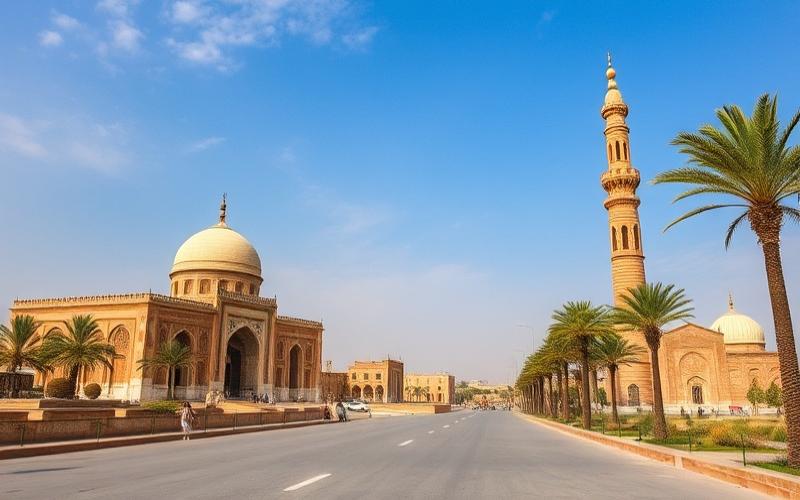
 Published on and written by Cyril Jarnias
Published on and written by Cyril Jarnias
In a global context where social protection systems play a crucial role in citizen welfare, it’s worth examining the evolution of Social Security in Bahrain. This Persian Gulf nation has established a dynamic system aimed at protecting its residents against various life contingencies, particularly through enrollment in essential protection schemes and the distribution of diverse benefits.
From retirement support to health insurance, including coverage for workers, Bahraini Social Security adapts to the needs of a heterogeneous and constantly growing population.
Exploring the mechanisms of enrollment and benefit details offered provides better understanding of how Bahrain successfully balances tradition and modernity in the field of social protection.
Social Protection System in Bahrain
The social protection system in Bahrain relies on several insurance schemes and benefits primarily managed by the Social Insurance Organization (SIO). It addresses both Bahraini and non-Bahraini workers, with distinct arrangements based on nationality.
| Main Component | Bahraini Workers | Foreign Workers | Non-Workers |
| Old-age, Disability & Death Insurance | Mandatory contribution via SIO (employer: 15%, employee: 7%) | Reduced contribution (employer: 3%, employee: 1%) | Not applicable |
| Unemployment Insurance | Employer and employee each contribute 1% | Same rate for expatriates | Limited or no access |
| Work Injury | Employer contributes 3% | Same | Not applicable |
| Health Insurance | Public coverage; access to public hospitals | Mandatory private health insurance provided by employer | Limited coverage through public network, often supplemented by private insurance |
| Family Benefits | Paid maternity leave, breastfeeding breaks |
Main Available Benefits:
- Retirement:
- Monthly pension payment based on contribution years.
- Unemployment Insurance:
- Allowance paid in case of involuntary job loss after minimum contribution period.
- Work Injuries:
- Compensation for temporary or permanent disability.
- Maternity Leave:
- 60 days including 45 days fully paid
- After returning to work: two daily breaks of one hour each for breastfeeding over six months.
Enrollment Criteria:
- Bahraini private sector workers: automatic enrollment upon hiring; employers responsible for declarations and payments.
- Foreign workers: mandatory registration with SIO for certain social risks; private health insurance contractually required.
- Non-workers/self-employed: partial access to public system (health), possibility to subscribe to voluntary insurance in some cases.
Managing Entities:
- Social Insurance Organization (SIO) – centralized management of mandatory schemes
- Tamkeen Fund – financial support/training to promote local employment
Recent Reforms and Initiatives:
- Gradual increase in social security rates reaching up to 25% by 2025, to ensure system financial sustainability
- Establishment or extension of Tamkeen Fund with more programs aimed at training local citizens
- Strengthening “Bahrainization” quotas imposing legal minimum of national employees in each company
Illustrative Statistical Data:
- Average overall social contribution rate: 19.68% between 2006–2025, peak expected at 25% end of 2025
- Annual revision of insurable salary ceiling
- Majority (>80%) of Bahraini employees covered by public old-age-disability-death scheme
- Over 60 days granted to pregnant employees annually for maternity leave
Summary List of Main Covered Components:
- Old age / retirement
- Disability & death
- Unemployment
- Occupational accidents
- Public health / possible supplementary health insurance
Some National Specificities:
- Priority given to local hiring (“Bahrainization”), active support for companies exceeding legal quotas
- Extended financial support/vocational training through Tamkeen
This system ensures broad but differentiated coverage based on professional and national status.
Good to Know:
The social protection system in Bahrain includes health insurance, retirement, and family benefits, primarily managed by the Social Insurance Organization; recent reform efforts aim to expand access and improve efficiency, with 75% of the population now covered by insurance.
Enrollment and Contributions for Expatriates
Social Security Enrollment for Expatriates in Bahrain
Expatriates must enroll in Bahraini social security upon arrival, primarily for work injury and unemployment insurance. Enrollment occurs automatically upon starting employment, through the employer in most cases.
Categories of Concerned Expatriates
- Expatriates working in the private sector
- Expatriates employed by government institutions (excluding diplomatic positions)
- Self-employed or unemployed workers (enrollment and payment at their own expense)
Responsible Parties and Social Contribution Calculation
| Category | Employee Contribution | Employer Contribution | Calculation Basis |
|---|---|---|---|
| Private Sector Expatriates | 1% of gross salary | 3% of gross salary | Monthly gross salary |
| Public Sector Expatriates | Same as private sector | Same as private sector | Monthly gross salary |
| Self-employed/Unemployed | Personal contribution | – | Personally declared |
- Contributions are deducted monthly and primarily fund unemployment and work injury insurance.
- Employers are responsible for remitting their share along with the employee’s portion to the relevant authorities.
Social Benefits for Expatriates
- Limited access: Expatriates do not have access to local retirement pension.
- Available benefits: unemployment compensation and work injury coverage.
- Healthcare: Expatriates must enroll in the public SHIFA fund, but coverage remains less extensive than for citizens. Access to public healthcare is restricted, leading most to subscribe to private or international health insurance.
Benefit Comparison
| Benefit Type | Local Residents | Expatriates |
|---|---|---|
| Retirement | Yes | No |
| Unemployment Insurance | Yes | Yes |
| Work Injuries | Yes | Yes |
| Public Healthcare | Full access | Limited access, often preferring private sector |
Other Deductions and Specific Mechanisms
Expatriate tenants are subject to a municipal tax of 10% on the average monthly rent.
There are no major bilateral agreements allowing social security rights transfer between Bahrain and other countries; coverage therefore depends exclusively on the local system and possible subscription to international insurance.
Key Takeaways
- Expatriates in Bahrain contribute to social security, but at lower rates and for fewer benefits than Bahrainis.
- The employer is primarily responsible for payment and remittance of contributions.
- Expatriates are strongly advised to supplement local coverage with international health insurance tailored to their needs.
Good to Know:
In Bahrain, expatriates working in the private sector typically come under company-specific insurance schemes and do not contribute directly to social security, while those employed by government institutions may have specific enrollment arrangements. Expatriates should check if bilateral agreements affect their social coverage, as these agreements can offer benefits similar to those of local residents.
Available Social Benefits
The social security system in Bahrain offers several social benefits to private and public sector workers, with distinct arrangements for Bahraini citizens and expatriates. Here is a detailed presentation of the main benefits, eligibility criteria, and specific available assistance.
| Benefit Type | Description | Amount / Terms | Eligibility Criteria |
|---|---|---|---|
| Health Insurance | Mandatory medical coverage for all Bahraini employees in private sector. | Partial or full coverage of medical expenses depending on contract. | Employee registered in national scheme; expatriates covered by private insurance |
| Retirement (Pension) | Payment of old-age or disability/death pension via SIO (Social Insurance Org.). | Employer contribution: 15% (Bahraini), 3% (non-Bahraini) | Minimum contributions required; legal age required |
| Employee contribution: 7% (Bahraini), 1% (non-Bahraini) | |||
| Unemployment Insurance | Monthly allowance in case of involuntary job loss for nationals and foreigners. | Up to 60% of last salary, min. 200 BD (~530 USD), max 1,000 BD (~2,650 USD) for max. 9 months | SIO registration >12 months, non-disciplinary dismissal, legal residence |
| “Unemployment assistance” allowance for young Bahrainis without experience | Graduates: 200 BD/month (~530 USD), non-graduates: 150 BD/month (~398 USD) for max 6 months | First-time job seekers |
Assessment of Social Security in Bahrain
Analysis of social security schemes in Bahrain reveals a plural structure adapted to citizens and expatriates, covering several major social risks:
- Retirement: Bahraini employees benefit from a mandatory scheme with social contributions split between employers (12%) and employees (7%). This system primarily funds retirement pensions.
- Unemployment Insurance: A specific scheme exists for Bahraini nationals, accessible from age 18 through the National Employment Program. Management is digital for greater transparency in tracking applications.
- Health Benefits: Citizens are covered by national social insurance, while expatriates must have private health insurance provided by their employer.
- Disability and Work Injuries: Coverage is integrated into the mandatory system for locals; for expatriates, it falls under private insurance or the end-of-service indemnity fund paid at contract termination.
Comparative Table of Social Contributions
| Scheme | Employer (%) | Employee (%) | Coverage |
|---|---|---|---|
| Bahraini Citizen | 12 | 7 | Retirement, unemployment |
| Expatriate | Indemnity | – | Private insurance |
Recent Enrollment Statistics
- The overall social security rate currently reaches 25%, with 17% borne by employer and 8% by local employee.
- Nearly 100% of local workers are enrolled in national scheme; majority of expatriates benefit only from private health coverage or Tamkeen Fund.
Impact on Quality of Life
The provided benefits contribute to significant improvement in social standards:
- Financial security upon retirement.
- Rapid support in case of involuntary job loss through digitalized system.
- Facilitated access to essential medical care.
Regional Comparison (Summary Table)
| Country | Mandatory Retirement | Unemployment | Public Health |
|---|---|---|---|
| Bahrain | Yes | Yes | Yes/partial |
| UAE | No | No | Partial |
| Kuwait | Yes | Limited | Yes |
| Saudi Arabia | Yes | No | Yes/private |
Bahrain thus stands out positively through its universal access to retirement and unemployment for its citizens. However, as in several neighboring states, protection remains limited or even non-existent for certain groups (expatriates).
Current and Future Challenges
List of main challenges:
- Financial sustainability: With high rate (25%), maintaining actuarial balance facing demographic aging requires constant adaptation.
- Accessibility: Improving integration of foreign workers while preserving local solidarity model.
- Expected reforms: Potential extension of covered scope (e.g., expanded disability compensation), increased automation through public digital platforms, regular adjustment of contributions according to economic conditions.
Key takeaway: Continuous evolution toward greater efficiency necessarily involves consideration of inclusive expansion while ensuring long-term financial viability.
Good to Know:
In 2022, approximately 52% of workers in Bahrain were enrolled in social security schemes, offering key benefits such as retirement and unemployment insurance, but the country must still strengthen financial sustainability and harmonize its system with more efficient Gulf models. The need for reforms to improve coverage and accessibility is felt facing growing demographic challenges.
Disclaimer: The information provided on this website is for informational purposes only and does not constitute financial, legal, or professional advice. We encourage you to consult qualified experts before making any investment, real estate, or expatriation decisions. Although we strive to maintain up-to-date and accurate information, we do not guarantee the completeness, accuracy, or timeliness of the proposed content. As investment and expatriation involve risks, we disclaim any liability for potential losses or damages arising from the use of this site. Your use of this site confirms your acceptance of these terms and your understanding of the associated risks.





























































